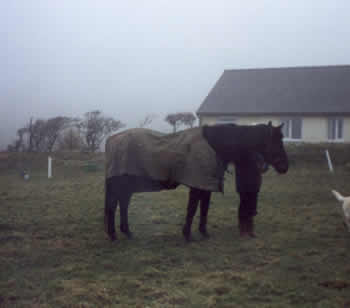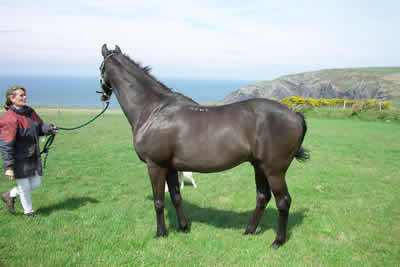|
An
Active Future For Older Horses
Trading
an old car in for a newer model is something all drivers do at least
once in their driving careers. It is a fairly emotion-free activity
involving little or no thought for the car that has been discarded
- unless the owner in question is prone to anthropomorphism!
The
situation is very different for a horse. When older horses are replaced
by younger animals, they are often retired while they are still
fit and healthy. With retirement forced upon them, their condition
deteriorates, they become depressed and they lose their zest for
life - especially if they are turned out all year round with no
rugs or protection.
And
as some humans do not take to retirement, so it is with some horses
that miss the physical and psychological stimuli of being active
and working.
However,
hope and help is at hand thanks to the Veteran Horse Society (VHS),
founded just 18 months or so ago and which will be bringing the
story of its success to the Midlands Equine Fair to be held at the
Three Counties Showground, Malvern, on 8 and 9 March.
The old saying "success breeds success" is no more evident
than within the VHS. It began life as simply a welfare organisation,
but now boasts specialist departments in showing, re-homing and
rehabilitation. The organisation housed 50 horses last year, and
has topped the figure of 1,000 members. A highlight of last year
was the success of the VHS Supreme Final at Olympia in December,
where the very best in the world of veteran equine was rewarded.
Julianne Aston of the VHS firmly believes that there is so much
more to gain from an older horse, and that they can be re-integrated
back into normal life. She said: "Regular exercise to whatever
level the horse is capable of keeps it fit and healthy and ensures
that joints remain supple and that its musculature can support its
weight. Many horses can develop arthritis in the front fetlock joints
at an older age - and this can be brought on or inflamed by allowing
the horse to work on the forehand, putting extra weight on the shoulders
and forelegs. By schooling and increasing the fitness of an older
horse, we can ensure that it carries itself correctly and so minimises
the risk of injury or deterioration."
 |
One
success story is that of Alibi, an underweight 16hh thoroughbred
who arrived at the VHS Centre with a dirty and scruffy coat,
mud fever to his knees and hocks and an extremely nervous disposition.
He was given immediate veterinary treatment including antibiotics,
anti-inflammatories and painkillers and was box rested. Because
he was very nervous he was boxed beside one of the VHS Centre's
permanent residents, Sylvia, who was a calming influence. There
followed a slow and progressive re-training programme, starting
with short walks around the centre and building up to short
hacks and longer walks. As Julianne commented: "He became
fitter and more toned, and a stunning black gelding just seemed
to emerge overnight!" |
 |
Alibi
has been successfully re-homed with Linda Goodman, who added:
"Now that his winter coat has gone everyone can see what
a handsome gentlemen he really is. But more than that, he's
honest, intelligent and has the most gentle nature. A total
sweetheart!" |
The
Veteran Horse Society will be attending the Midlands Equine Fair
at the Three Counties Showground, Malvern on 8 and 9 March, and
experts will be on hand to help you get the most out of your older
horse, or discuss with you ways in which you might want to re-home
a veteran yourself.
Tickets for the Midlands Equine Fair are available in advance from
Contour Exhibitions & Events by calling 08700 115007 and advance
booking discounts are available. Further information and leaflets
are available by calling 01884 841644, or by logging on at www.contour.uk.net.
.
|







